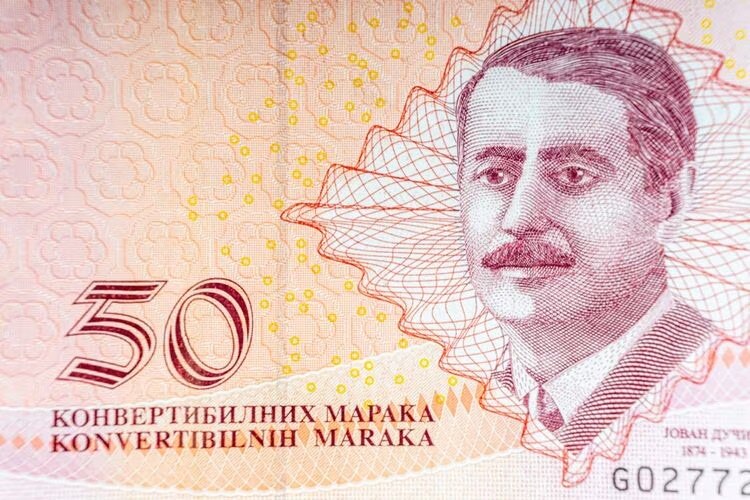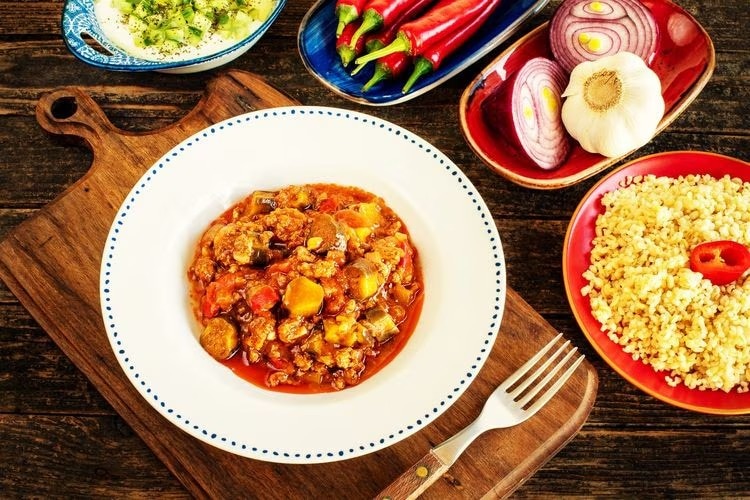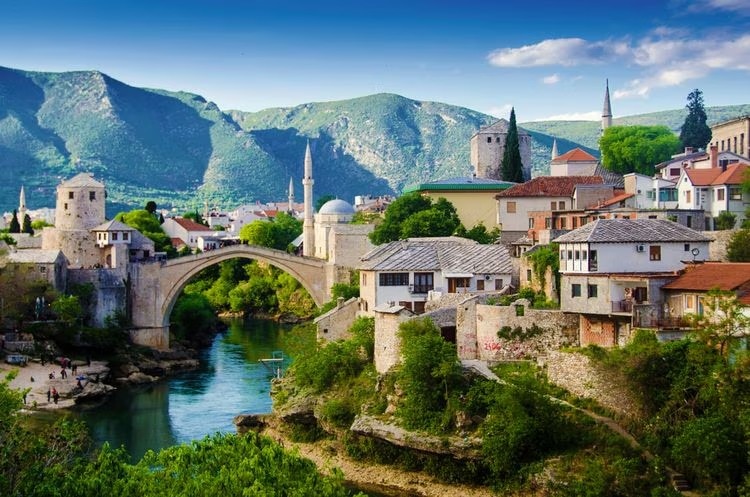Bosnia-Herzegovina Travel Tips and Information

Origin of Image source: shutterstock.com
Official Name
----
Capital
Sarajevo
Population
Country Code
Approximately 3.16 million
BA
Country Code (international calls)
+387
The flight time to Bosnia-Herzegovina is approximately ---- hours. Check the climate, currency, religion, manners, other information of Bosnia-Herzegovina below. Wishing you pleasant travels to Bosnia-Herzegovina.
Located in the Balkans of Eastern Europe, Bosnia and Herzegovina is a republic composed of the Federation of Bosnia and Herzegovina and the Republika Srpska.
Local Climate / Weather
Bosnia and Herzegovina has a diverse climate influenced by its geographic variety, with continental weather in the interior and a Mediterranean climate along the southern Adriatic coast. Winters can be quite cold, especially in the mountainous regions, where snowfall is common from December to February, making it ideal for winter sports enthusiasts who can enjoy skiing and snowboarding in places like Jahorina and Bjelašnica. Summers, especially in areas like Mostar, can be hot and dry, with temperatures reaching 30°C (86°F) or higher, providing an inviting atmosphere for outdoor activities and exploring historic towns. For seasonal travel, spring and autumn are often recommended as the best times to visit Bosnia and Herzegovina, as the temperatures are mild and the landscapes are especially scenic, with wildflowers blooming in spring and rich autumn colors appearing in October. Travelers in summer will find the coast particularly appealing, while those in winter can enjoy the snow sports and Christmas markets in cities like Sarajevo. Each season offers its unique appeal, making Bosnia and Herzegovina a year-round destination depending on your interests. The country’s rich cultural heritage is highlighted in its many annual festivals and events. Sarajevo Film Festival, held each August, is one of the biggest in Europe and attracts international visitors and celebrities. In spring, the Mostar Bridge Jumping competition in July showcases traditional diving feats from the iconic bridge, drawing crowds for an exciting spectacle. During winter, visitors can enjoy the Sarajevo Winter Festival, which celebrates art, music, and theater from February to March. With these events and festivals throughout the year, travelers have many opportunities to experience the local culture and heritage firsthand.
Currency & Tipping
Currency
The official currency of Bosnia and Herzegovina is the Bosnia and Herzegovina Convertible Mark (BAM), often abbreviated as KM. The currency includes banknotes in denominations of 10, 20, 50, 100, and 200 KM, along with coins in smaller denominations like 5, 10, 20, and 50 fenings (the subunit of KM), and 1, 2, and 5 KM coins. The currency is tied to the Euro, with a fixed exchange rate, making it stable for travelers.
Tipping
Tipping is appreciated but not obligatory in Bosnia and Herzegovina. For good service, rounding up the bill or leaving a small tip—typically around 10%—is customary in restaurants and cafes. Tipping in taxis is less common, though rounding up to the nearest mark is appreciated. For tour guides or hotel staff, a small tip is also a nice gesture for attentive service.
Useful Travel Information

Voltage & Electrical Outlets
Bosnia and Herzegovina operates on a 230-volt electrical system with European-style two-pin outlets (Type C and Type F), so all travelers will need an adapter if their devices have different plugs. Most hotels and accommodations provide adapters, but it’s recommended to bring your own to ensure compatibility with electronic devices.

Internet Connectivity
The internet environment in Bosnia and Herzegovina is generally good in urban areas, with Wi-Fi widely available in hotels, cafes, and public spaces in cities like Sarajevo and Mostar. Mobile SIM cards with data packages are affordable and can be purchased at airports or local shops, offering a convenient way for travelers to stay connected throughout the country.
Water for Consumption (Drinking Water)
Tap water in Bosnia and Herzegovina is generally safe to drink, particularly in urban areas, where it meets high-quality standards. Many locals drink tap water without issues, and fresh mountain springs are common in rural areas, providing clean, natural drinking water. For those with sensitive stomachs, bottled water is also available and inexpensive.
Culture, Religion & Social Etiquette
Culture
Bosnia and Herzegovina has a rich cultural tapestry influenced by its complex history, blending elements from Eastern and Western traditions. The country’s cultural identity is expressed through its music, dance, and vibrant arts, while historic architecture in cities like Sarajevo and Mostar reflects its Ottoman, Austro-Hungarian, and Yugoslav past. All travelers will find Bosnian culture warm and hospitable, as Bosnians are known for their close-knit communities and strong family values.
Religion
Religion in Bosnia and Herzegovina is diverse, with Islam, Eastern Orthodoxy, and Roman Catholicism being the predominant faiths. The country’s religious landscape creates a unique cultural blend, with many festivals, customs, and holidays that all travelers may find similar to their own, especially around Christmas, Easter, and Ramadan. Visitors will notice the peaceful coexistence of mosques, churches, and synagogues, which is a testament to the country’s multicultural harmony.
Social Etiquette
Bosnian manners emphasize politeness and respect, and locals are known for their friendliness and openness toward visitors. All travelers, with their own culture of warmth and hospitality, will likely feel welcomed. When visiting someone’s home, it is customary to bring a small gift, and it's polite to remove your shoes upon entering. Bosnians also value shared meals and social gatherings, so travelers may find themselves invited to enjoy coffee or traditional dishes, offering a wonderful way to experience local hospitality firsthand.
Food Culture
Bosnia and Herzegovina's food culture is a flavorful mix of Eastern and Western influences, creating a unique and hearty cuisine that All travelers will enjoy. Traditional dishes like cevapi (grilled minced meat sausages), burek (savory pastry filled with meat or cheese), and pita (handmade pies) reflect a strong Ottoman heritage, while influences from Central Europe add variety. Street food is popular, with vendors selling delicious snacks like cevapi served in warm pita bread with onions and kaymak (a type of cream). For a full experience, visit local restaurants in Sarajevo, like Avlija and Dveri, where you can try authentic Bosnian dishes alongside regional favorites, or head to Mostar for scenic dining spots with river views. This mix of rich flavors and welcoming venues makes dining in Bosnia and Herzegovina an essential part of the travel experience.
Major Tourist Attractions & UNESCO World Heritage Sites
Major Tourist Attractions
Bosnia and Herzegovina offers a wealth of major tourist destinations that all travelers will find captivating, from vibrant cities to picturesque landscapes. Sarajevo, the capital, is known for its unique blend of Eastern and Western cultures, offering travelers a journey through history at the Old Town, Baščaršija, with its Ottoman-style bazaar and traditional coffee shops. Mostar is another must-visit, famous for its iconic Stari Most (Old Bridge), a stunning piece of Ottoman architecture that spans the Neretva River. The city’s Old Town is perfect for exploring, filled with quaint shops and riverfront cafes. Nature lovers will enjoy a trip to the Una National Park, with its turquoise rivers, waterfalls, and excellent spots for hiking, rafting, and swimming. These destinations provide a rich blend of cultural and natural attractions ideal for adventure and relaxation alike.
UNESCO World Heritage Sites
Bosnia and Herzegovina also boasts several UNESCO World Heritage Sites that highlight its cultural and historical significance. The Old Bridge Area of Mostar, renowned for its Ottoman influence, is a beautifully preserved site and a symbol of resilience. Another heritage gem is the Stećci Medieval Tombstones Graveyards, which showcase unique medieval tombstones across several sites in Bosnia and Herzegovina, telling stories of the region’s past. The Mehmed Paša Sokolović Bridge in Višegrad, a stunning 16th-century bridge, offers a glimpse into the architectural achievements of the Ottoman Empire and serves as a peaceful site for reflection. Exploring these heritage sites provides all travelers with an enriching experience, offering insight into Bosnia and Herzegovina’s historical depth and cultural diversity.
Voice of Travelers to Bosnia and Herzegovina
Reliable, efficient and safe transportation
Bosnia and Herzegovina flights are reliable and efficient in regards to the air ticket purchase process. The transportation is safe, with quick response times from a polite, helpful staff. For budget travellers, go out of the airport exit and turn right. You will see a footprints sign on the ground. Follow the footprints, and it will lead you to the nearest bus stop. It costs 5 BAM to the city center. My reccomendation is to buy the ticket from the driver. I would not hesitate to use this service again when in Bosnia and Herzegovina -- it was much easier than figuring out taxis from the airport of Bosnia and Herzegovina.
For budget travellers, low air ticket prices
I was astonished by the low air ticket price to Bosnia and Herzegovina. Service was on par with major European airlines and the food and beverage options were excellent. Upon arrival, my wife and I were greeted by the sight of rich scenery and a history of the country. The old mosques are a must see, especially if you are an art and history buff lie we are!
Travel FAQs
What is the safety situation in Bosnia and Herzegovina like? What should I be careful of?
Bosnia and Herzegovina is generally safe for travelers, but all travelers should exercise caution due to certain risks. Unexploded landmines remain a danger; it's advisable to stay on main roads and avoid isolated mountain areas. Additionally, while violent crime rates are relatively low, petty crimes like pickpocketing can occur in tourist areas.
What is the best season to go to Bosnia and Herzegovina?
The best time to visit Bosnia and Herzegovina is during the summer season from May to August.
What is the most popular airport to fly into Bosnia and Herzegovina?
Sarajevo Airport, the largest airport in the country, is popular.
Is English spoken in Bosnia and Herzegovina?
English is relatively widely spoken in tourist areas. You shouldn't have any trouble sightseeing.



